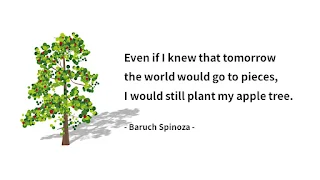The quote emphasizes hope and the potential for positive change, encouraging perseverance and optimism in the face of adversity.
Quote of the Day: Perseverance & Hope
Even if I knew that tomorrow the world would go to pieces, I would still plant my apple tree.
- Baruch Spinoza -
Quote Meaning:
This quote is attributed to Baruch Spinoza (1632-1677), a Dutch philosopher and Jewish thinker. Some attribute it to the German Reformer Martin Luther (1483-1546), but the two men lived at different times, and there's no definitive proof of who exactly this quote belongs to. However, regardless of its origin, the quote remains popular and symbolizes the resolve and determination to act for the future despite external circumstances - in essence, to remain undaunted and hopeful amidst uncertainty. The act of planting an apple tree serves as a metaphor for fostering hope and sustainability for the future. The underlying message is that such hope and action have the potential to pave the way for a brighter tomorrow. It underscores the significance of hope and resilience, encouraging us to persevere and maintain optimism, while highlighting the importance of working towards a better future. As we contemplate and endeavor for the future, it imparts an uplifting message, emphasizing the value of persistence and hopefulness, and reminding us that even small actions can yield significant results.
Who was Baruch Spinoza?
Baruch (de) Spinoza (1632 - 1677) was a philosopher of Portuguese-Jewish origin. Spinoza's profound influence on modern biblical criticism, 17th-century rationalism, and contemporary conceptions of the self and the universe made him one of the most important and radical philosophers of the early modern period. Spinoza's philosophy encompasses almost all areas of philosophical discourse, including metaphysics, epistemology, political philosophy, ethics, philosophy of mind, and philosophy of science. Spinoza published few of his writings during his lifetime, and with the exception of Descartes' Principles of Philosophy, which was published under his own name, and the Theologico-Political Treatise, which was published anonymously, the Ethics and all of his other works were published after his death in 1677.
Motivational Quotes To Inspire You.
#Baruch Spinoza #Hope #Hopeful #Positive Change #Optimism #Determination #Uncertainty Future #Action












No comments:
Post a Comment
Thank you~!